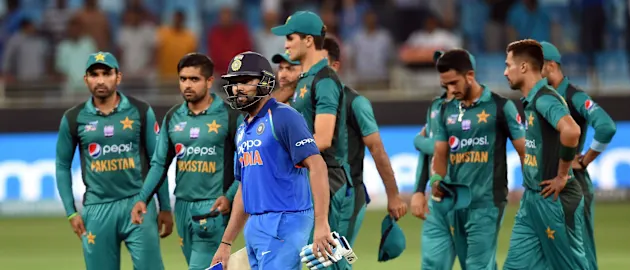'India's skill-level is high, ours is not quite there' – Sarfraz Ahmed


India's victory against Pakistan in their second Super Four game in Dubai followed a tone similar to their previous two victories.
While Pakistan bettered the 163 they scored the last time they faced India, in the group stage, they could not capitalise on the position of strength – they were 165/3 at one stage with both Ahmed and Shoaib Malik set at the crease – but stuttered towards the end of the innings.
India recorded a convincing nine-wicket victory over Pakistan today.
— ICC (@ICC) September 23, 2018
Match report 👇👇https://t.co/0J5xUf0AXm pic.twitter.com/WRBU0ZdCen
In both games, India picked up wickets with the new ball and had the opposition's top three back in the pavilion for not many before the first drinks break. If it was Bhuvneshwar Kumar in the first game, Chahal and Kuldeep Yadav did the damage on Sunday, 23 September by dismissing both Pakistani openers.
Chahal, who finished with 2/46 from nine overs, credited the fast bowlers for building enough pressure in the first few overs, thereby helping the spinners to bowl according to their plans.
"The new-ball bowlers usually bowl seven to eight overs before we spinners come into the attack, and the pressure they build on the batsmen with the new ball – they concede not more than 20-25 runs – helps us plan our line of attack as to where to bowl to maintain that pressure," Chahal explained after the match.
Player of the match: @SDhawan25
— ICC (@ICC) September 23, 2018
Well deserved 👏👏👏 pic.twitter.com/ak31h3xKyI
"Because if you don't give away boundaries in this format, the batsmen will inevitably be under pressure."
That was indeed the case. India conceded only four boundaries in the first 15 overs and, consequently, opening bat Fakhar Zaman, who had been reined in for an uncharacteristic 31 off 44, tried to sweep Yadav across the line and was dismissed leg before wicket.
Chahal was introduced in the eighth over, inside the first Powerplay, and responded immediately by trapping Imam-ul-Haq in front of the wickets. He said he is now comfortable with bowling with field restrictions given how much he has bowled in the Powerplay in Twenty20 cricket.
7,000 ODI runs for Rohit Sharma!
— ICC (@ICC) September 23, 2018
Just the ninth Indian batsman to reach that landmark. #PAKvIND pic.twitter.com/znn66WXoRV
"I have bowled quite a lot during the Powerplay in the IPL [Indian Premier League] and T20s, so this isn't anything new for me," he said. "I keep practising for it in the nets and vary my pace and lengths according to the wicket."
However, while the three Indian spinners were effective, returning four wickets between them, their Pakistani counterparts in Mohammad Nawaz and Shadab Khan weren't quite so.
Khan was particularly expensive, giving away 54 runs in eight overs. Chahal attributed it to the pressure Shikhar Dhawan and Rohit Sharma – they added 210 runs for the first wicket and both of them scored centuries – had already created on the opposition by the time spinners came on to bowl.
"Our batsmen put their bowlers under pressure right from the word go," Chahal said.
"At times, when batsmen are not under pressure, it becomes easy to face the bowlers. And on this wicket, you have got to vary your lines and lengths.
"I think they have been doing that, but the situation here was slightly different in that we were 150 without loss, and that's why (Pakistan's) bowlers were also down mentally."
The Pakistani bowlers were not helped by the poor show in the field. Haq dropped Sharma off Shaheen Afridi early in the Indian innings and there were several lapses in the field, much like the way Pakistan had fielded in their last outing, against Afghanistan.
India beat Pakistan by nine wickets with 10.3 overs to spare.
— ICC (@ICC) September 23, 2018
A convincing win for them in the #AsiaCup.
Re-live the day's action and follow the post-match reaction 👇👇https://t.co/0SqS4ClLWD pic.twitter.com/3ACQUHZkt5
Ahmed rued the missed opportunities and said Pakistan have to field better if they are to challenge India. "If we keep dropping catches, we won't win games," he said after the match.
"We've done hard work at fielding. So I'm not sure what's going wrong. I thought the pitch was difficult to bat on, that it would be hard for a new batsman to start here and for that reason we should have held on to our catches."
Conceding that Pakistan were "20-30 runs short" Ahmed lauded Sharma and Dhawan for their performance and talked about a mismatch in the skill level between the teams.
"They had set batsman to do the job. We're trying to get early wickets, we're talking with the bowlers, and when we don't get them, with batsmen like Rohit and Dhawan, it's hard to come back," he said.
"Their skill-level is high, ours is not quite there, but by the final, we'll get better. It's a do-or-die match for us in the next game (against Bangladesh), we'll do our best."
